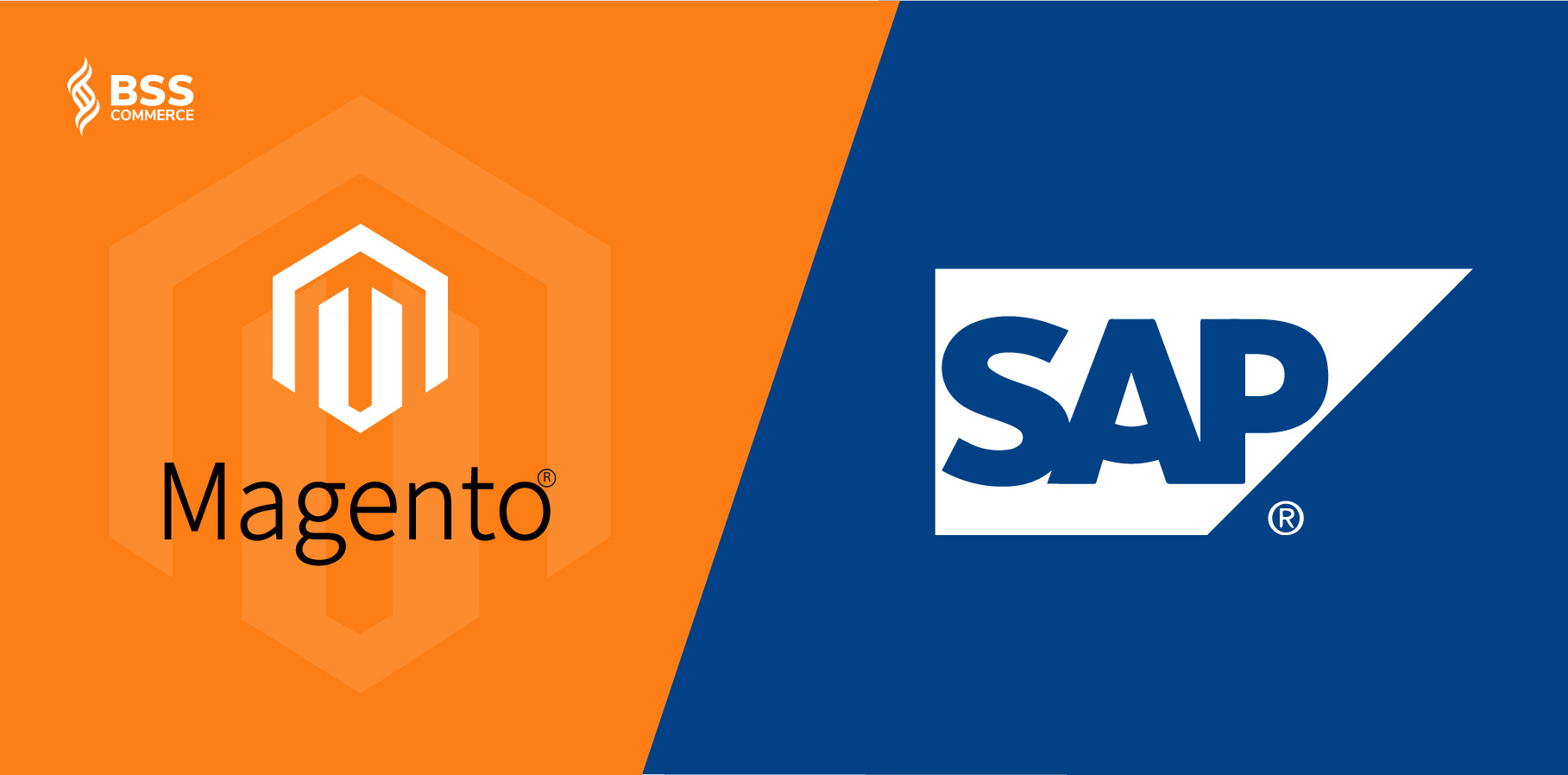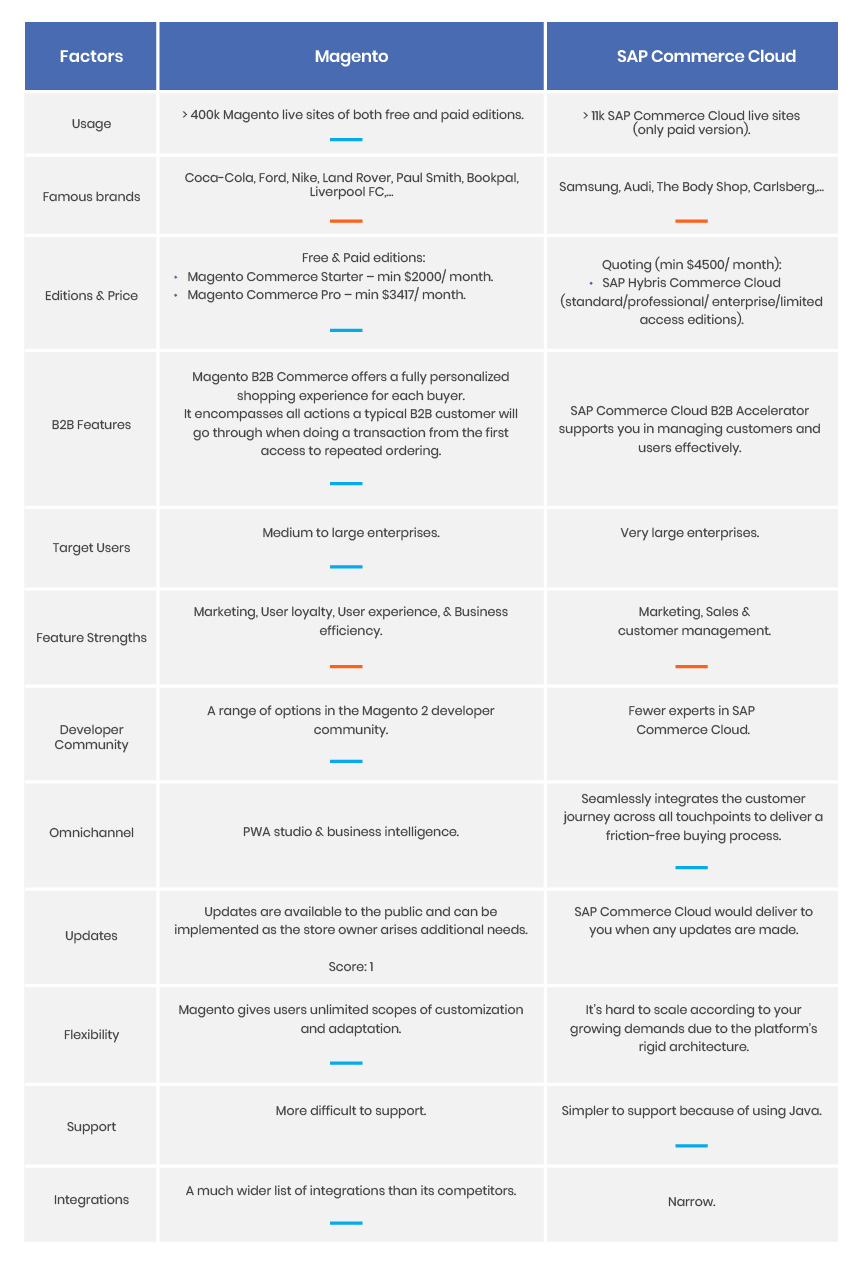We’re here with another post in our series of Magento eCommerce competitors comparison so that you can pick the best fit for your online store. Our rivals today are Magento vs SAP Commerce Cloud (formerly known as SAP Hybris) – two big players in the eCommerce playground.
Each provider has its own pros and cons, so it depends on your specific business requirements to choose a suitable platform for your website development. Let’s try to answer some questions such as: Are you running a B2B or B2C company? What is your budget spent on site-building? Agency or in-house developer, which one will you choose?
After you’ve asked yourself quickly, continue reading to comprehend the highlights of both providers. We will compare Magento vs SAP Hybris through main criteria including top features, B2B functionality, development costs, and some others.
Magento vs SAP Commerce Cloud Overview
Table of Contents
About Magento
For over a decade of development, Magento has provided a considerable number of merchants with a practical and modern method, powering them to become a big player in the eCommerce field. This platform has always ranked high in all the comparison charts from reputable analytics reports.
Take a deep delve into the Magento eCommerce, its features, and how to launch a Magento store from scratch in this post: What Is Magento Ecommerce and All You Need to Know About It
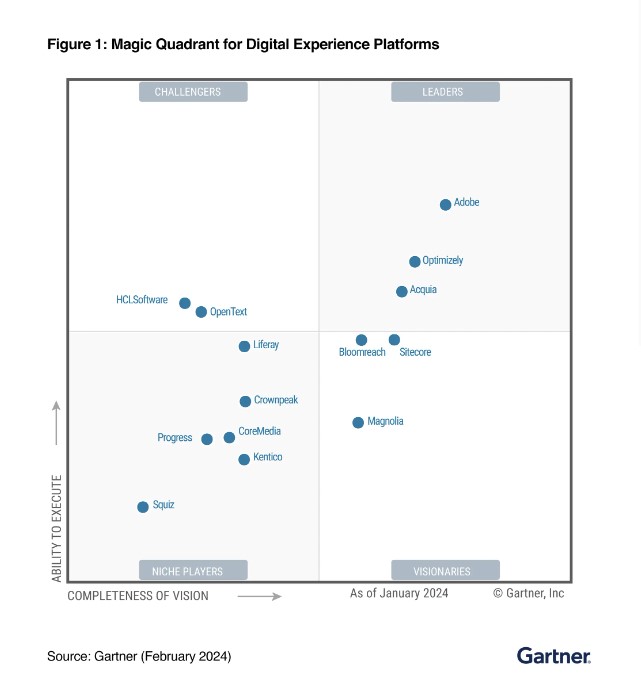
Currently, with thousands of live sites and over 2.5 million downloads, Magento stands among the leading open-source eCommerce platforms.
Building an ecosystem of 150k+ developers and 300+ professional solution providers, Magento, undisputedly, tops the “billboard” regarding efficiency, agility and adaptability, and low total cost of ownership. Not only that, but you can savor a fundamental set of enterprise processes that embraces every business demand to manage key accounts and multiple brands.
Magento offers 3 editions, among which is one free-of-charge edition and 2 charged versions:
- Magento Open Source (Magento 2 Community Edition);
- Magento Commerce (Magento 2 Enterprise Edition);
- Magento Commerce Cloud.
In general, Magento Commerce Cloud is a premium edition with the most robust features that you must know to build an eCommerce website.
Still confused about one with another? Then DON’T HESITATE to explore the differences between Magento 2 Community Vs Enterprise!
SAP Commerce Cloud
Hybris, a German eCommerce company, was acquired by SAP in 2013 and renamed SAP Hybris (SAP Hybris vs SAP Commerce Cloud). Recently, SAP developers saw the urge to move away from Hybris architecture, so they built SAP Commerce Cloud on top of SAP Hybris. This suite comes with eCommerce capabilities related to CRM, Marketing Automation, and other data integrations within SAP’s software services mix.
Skim through this table to absorb the characteristics of our two leaders:
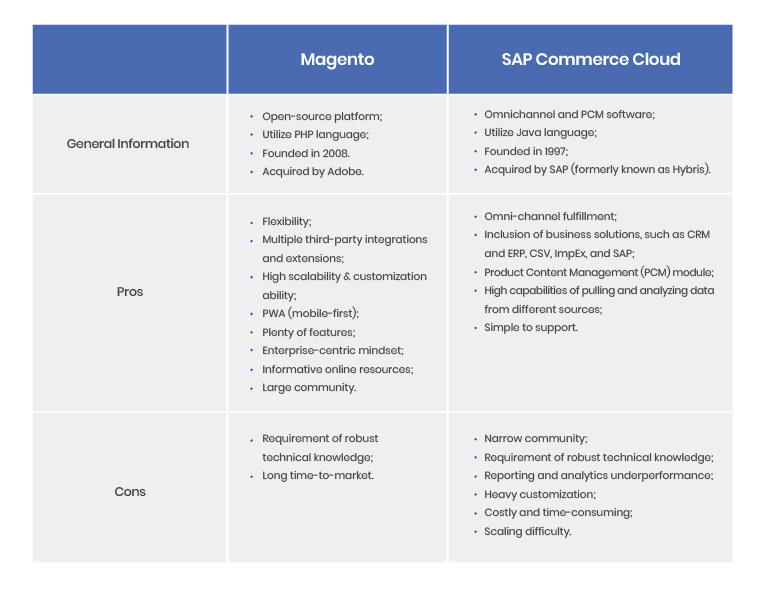
You may also interested in other platform comparison articles for deeper consideration:
Magento vs SAP Commerce Cloud: Full Comparison
Magento 2 vs SAP Hybris Key Features
While SAP Commerce Cloud (SAP Hybris vs SAP Commerce Cloud) is well-known for enterprise resource planning (ERP) software, Magento defeats its rivals in many aspects such as flexibility, multi-device optimization, brand identity boost, a myriad of Magento plugins store, and more.
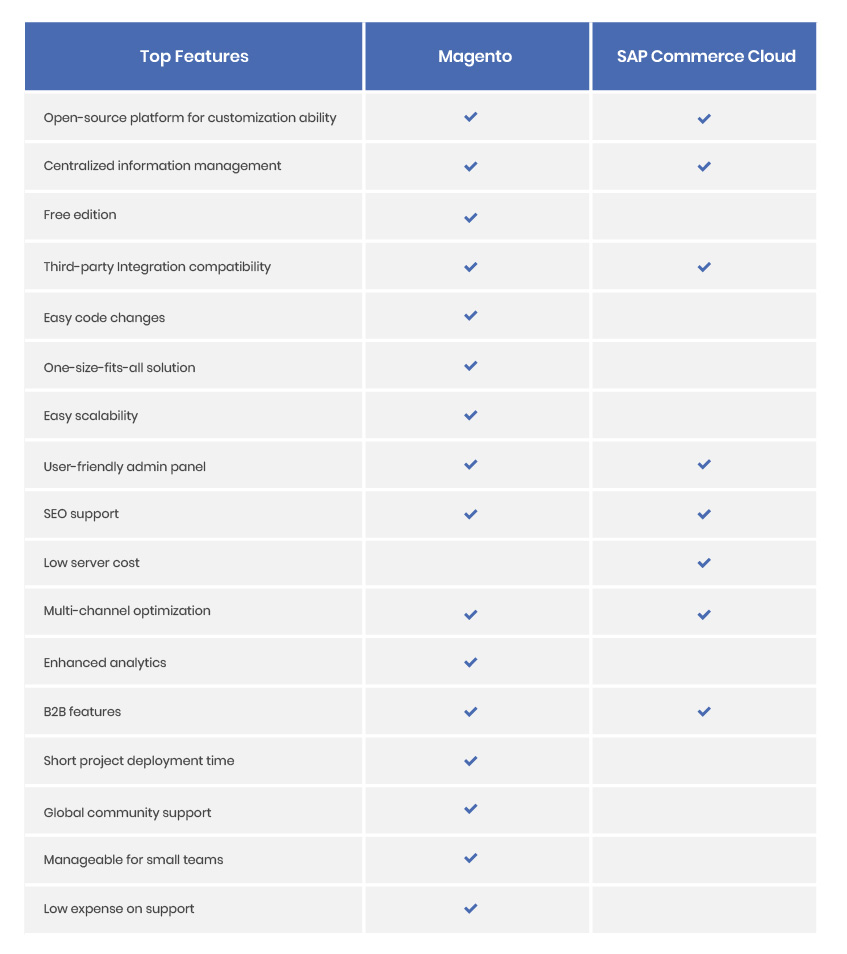
Magento
Magento offers a comprehensive set of features designed to empower eCommerce businesses:
- Optimized order placement process and effectively repeated orders.
- Multi-channel network: For companies with multiple brands and branches, Magento enables the admin to set up various business lines, storefronts, and brands.
- Pricing negotiation and quoting management.
- Custom pricing & catalogs: You can use different ERP solutions to guarantee alignment between inventory and pricing.
- Payment methods: In the B2B environment, payment options can either include net terms or lines of credit which are tailored to each specific customer. This online e-commerce platform guarantees a full range of payment methods including credit cards, payment on account, or alternative options.
- All-in-one solution for B2B eCommerce.
- Magento 2 themes: Although Magento doesn’t offer pre-defined themes, there is a forest of free-to-paid theme options by third-party providers.
- Add-ons & functionality: Developers can easily create new apps and plug-ins, as well as install extensions without fearing compatibility issues. On the Magento marketplace, you can find all new integrations such as TaxJar, Bronto, Avalara’s AvaTax, and Instant Search +.
- Customer Support: Magento delivers detailed online resources including the help center, forum, documentation, sales portal, user guides, and blog.
If you want to create a Magento store from scratch, BSS Magento web development is a wise choice.
SAP Commerce Cloud
SAP Commerce Cloud provides cross-channel eCommerce solutions consisting of sales, marketing & revenue, and customer service.
- Dynamic customer profiling: This feature facilitates marketers to access large prospect and client data in a single interface. The dashboard includes client interests, and behaviors, mapping the buyer journeys, and analytic tools to study purchase trends.
- Segmentation & campaign management: You can tailor campaigns in real-time to customer preferences.
- Commerce marketing: Present product recommendations on-site as alternatives to what the customer is searching for, based on his/ her order history and business segment.
- Loyalty management solution: Store owners can grant loyal customers gift cards or points to increase their engagement.
- CRM & marketing lead system: Enable you to analyze insights about factors influencing purchasing decisions.
- Customer Support: SAP online resources are also available, including the community forum, video tutorials, and the help platform.
B2B Feature Smackdown: SAP Hybris vs Magento
Let’s dive into a head-to-head comparison of B2B features between Magento vs SAP Commerce Cloud to determine which platform best suits the needs of your business.
Magento
No matter what Magento edition you are using, there would be a jungle of Magento 2 B2B solutions out there for you to choose from. Magento Commerce & Magento Commerce Cloud (2 paid licenses) have included must-have B2B features to ensure the best site performance and above-par user experience. Moreover, you can also utilize additional extensions for Enterprise to lift your online store to a new level.
For those using Magento Open Source, it’s quick and easy to integrate Magento 2 B2B extensions at a competitive price point from trusted providers.
In fact, the B2B flow in Magento varies a little depending on each provider’s logic; yet, the same point is that Magento Commerce B2B features cover every step of typical customer buying journeys:
Top Magento 2 B2B Features:
- Customer Verification: Requiring visitors to log in is the first gate that leads customers to the right place on your Magento B2B website and verifies their identity. Magento offers features to restrict access to some pages/ categories per customer group, which therefore will ensure effective customer segmentation.
- Corporation Data Management: The main subject of Magento B2B is the Company. So Magento includes functions like unique B2B registration forms, shared accounts for multi-users, and sales reps to specific customers. These are the prominent strengths of Magento that have never been defeated by any other platforms because they help show the professionalism and consistency of a B2B eCommerce business.
- B2B Pricing Diversification: Hide price and Custom pricing features will simplify your pricing setup process for different customers/ customer groups.
- Smooth Negotiation Process: A typical B2B company often goes through the dealing stage before placing any order. That’s why the Request for Quote feature is a must for any online business to facilitate communication between buyers and sellers.
- Quick Bulk Ordering: Corporate customers can search and order all products under a single Quick Order form without visiting each product page one by one. Also, completed orders lie in the history of the customer dashboard for reordering in the blink of an eye.
- Future Purchasing Plan Support: Requisition lists/ Multiple Wishlists serve the interval purchasing plans of customers. They can save and categorize their favorite products into lists.
- Shipping & Payment Optimization: Merchants can assign shipping & payment methods to specific customers or locations. Also, customers can utilize purchase orders (PO) as a payment method at the checkout stage.
- Customer Retention: Grant store credits to the customer balance to encourage them to do more transactions with you.
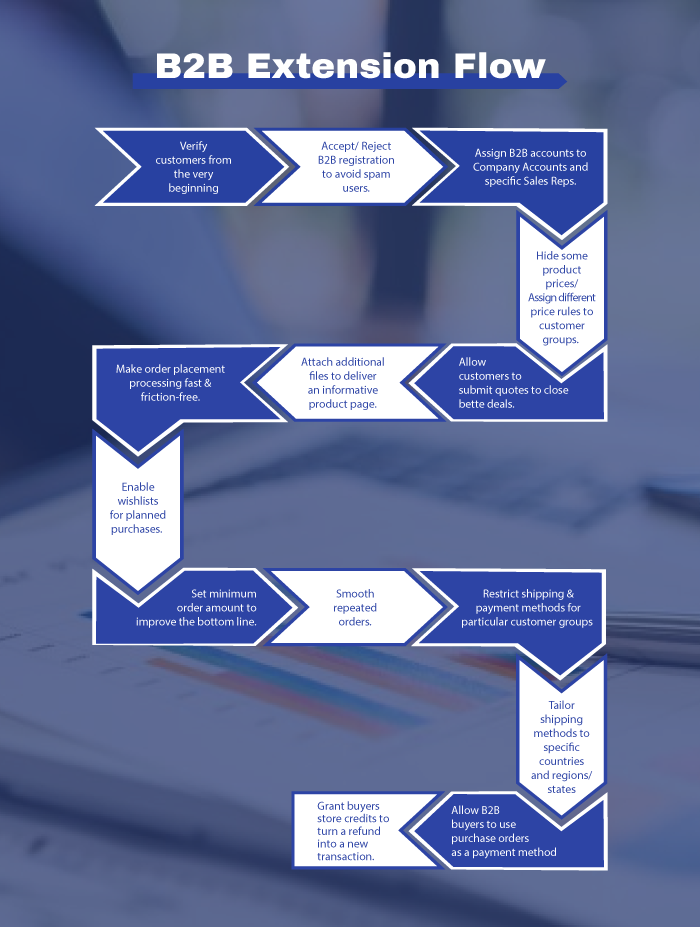
Crave for more details? READ >> Magento 2 B2B Starter Guide to comprehend full Magento capabilities!
SAP Commerce B2B Accelerator
Being famous for an effective omnichannel solution for enterprises, SAP Commerce B2B Accelerator offers the capabilities you need to gain and maintain long-term corporate customer relationships. It’s also convenient to select fully integrated merchandising tools such as promotions, cross-sells, up-sells, and advanced personalization.
Below are lists of outstanding features of SAP Commerce B2B Accelerator:
- Back Office integration: Backoffice is a flexible SAP-based administration framework that ensures the creation of business tools and user interfaces to take place smoothly. The main target is to bring a user-friendly and customizable widget-based interface.
- Early Login: Force guests to sign in before seeing content to protect valuable materials.
- Self-service account management: The admin user can assign rights to employees, configure personal purchasing limits, set approval rules and workflows, and take full control of cost centers and budgets.
- Custom pricing and catalogs: Like Magento, SAP Commerce Cloud also enables merchants to customize product lists and complex B2B pricing models, which are managed either in SAP Commerce or in an ERP system.
- Price quote requests: Buyers can negotiate the price of an order before closing the deal.
- Credit management: Store owners can assign multiple credit limits with a variety of currency and date range options.
- B2B order form: This supports advanced product search by using bar code or product code and by text or delimited list.
- PunchOut support: The B2B site can be integrated with customer procurement systems. Orders are automatically translated into purchase requisitions that are saved to the customer’s procurement system.
Magento vs SAP Commerce Cloud: Pricing
In terms of TCO and ROI, Magento is the winner. Compared to its competitors, the development and maintenance costs of Magento 2 are 50% lower.
Actually, when we compare Magento 2 vs Hybris, SAP Commerce Cloud doesn’t have fixed pricing plans for the base platform, all will be sealed through the quoting process. But the entry point starts from over $100k/ year for subscriptions and $50k per license.
Meanwhile, an initial Magento Commerce setup will cost a company $120,000 per year. Rates are negotiable, depending on the business infrastructure. Look at the following table to comprehend basic Magento building costs between Magento Open Source vs Commerce vs Commerce Cloud:
Costs Of Each Magento Edition (Per Year)
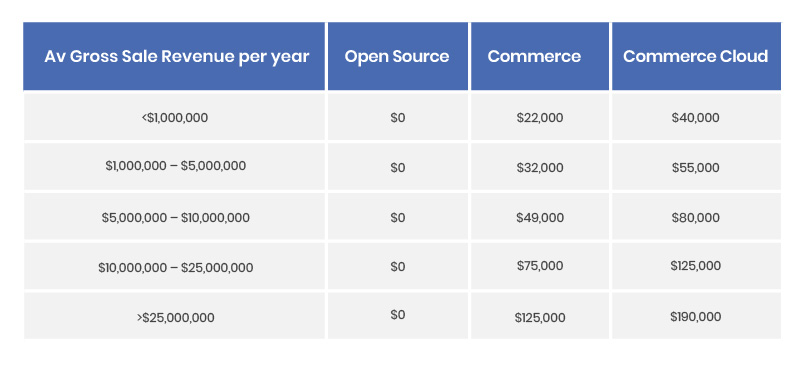
Even those using Magento Open Source with a desire for site upgrades, merchants can easily integrate premium Magento 2 extensions on the market at much more reasonable price points.
CALCULATE your website building costs now for the best preparation through our Magento B2B Pricing guide.
How Magento Stays As the Commerce Leader
The following comparison table of Magento vs SAP Commerce Cloud will clarify why Magento can be the industry-leading platform for a plethora of eCommerce stores in such a long time.
Coming to the end, you may have the answer to which platform would match your business goals and budget. The battle of SAP Commerce Cloud vs Magento has never ended. The final decision will depend on your time, budget, development direction, target customers, company size, and specific demands.
If you’re running a very large business, have a wide budget, and tend to stick to one provider only, you can consider SAP Commerce Cloud. The platform offers merchants a complete “suite” experience because it is integrated with other SAP software services like SAP S/4HANA®, the SAP ERP application, and SAP C/4HANA suite (SAP Marketing Cloud, SAP Service Cloud, and SAP Sales Cloud portfolios). This enables you to commence an extensive relationship with one large technology provider.
Nevertheless, the downside is you would be limited to only the SAP ecosystem and don’t have many choices. As a result, if you appreciate the scalability, easy customization, flexibility, and a wider community, we highly recommend Magento.
In a Nutshell…
In conclusion, in our comparison of Magento vs SAP Commerce Cloud (SAP Hybris ), both have proven themselves as robust and powerful CMS. The major factor here is online store size: Magento for medium and large-sized businesses and SAP Hybris for large-scale eCommerce projects.
If both Magento 2 and SAP Hybrids are not fit for your business, exploring alternatives is a wise choice. BSS Commerce also compiled 15+ best B2B eCommerce Platforms worth considering. Here you can compare Magento vs Shopify vs WooCommerce or other platforms and choose the best one to build your online store.
BSS Commerce is one of the leading Multi-platform eCommerce solution and web development service providers in the world. If you’re considering migrating from platforms like SAP Commerce Cloud to Magento, leveraging services like BSS Commerce’s Magento migration service can streamline the process and ensure a smooth transition. With experienced and certified developers, we commit to bringing high-quality products and services to optimize your business effectively.
If you plan to build a B2B/ B2M website on any platform, don’t hesitate to consult us for free to choose the best solution that fits your budget and requirements. We are willing to support you at any time.
